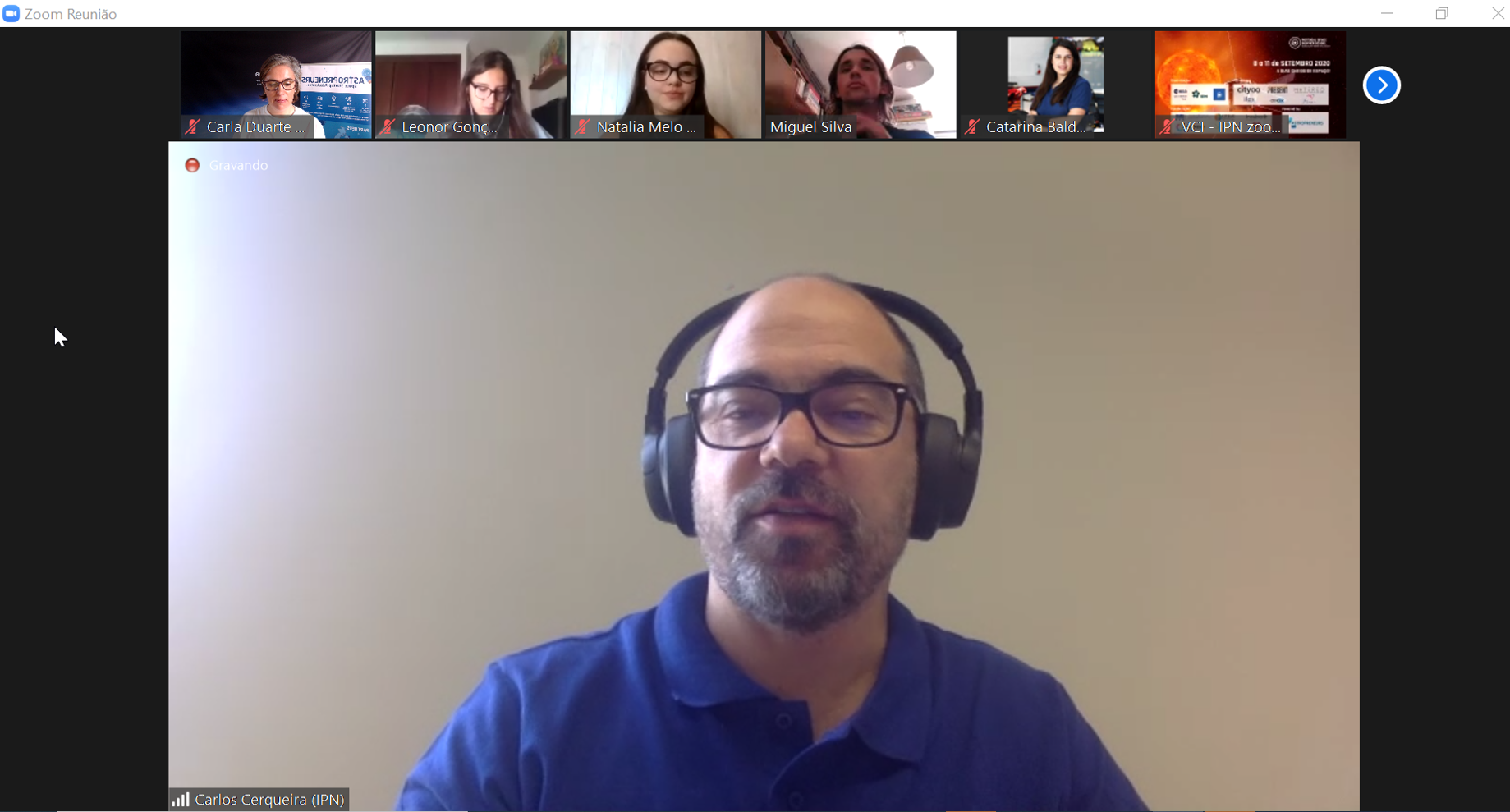ESA Space Solutions Portugal hosted the sixth Portugal Space Summer School in partnership with the Geophysics and Astronomic Observatory of the University of Coimbra on 8-11 September 2020. Despite being totally remote for the first time, the event, with its theme of the sun and space weather, was hugely successful and attracted more participants than ever before.

The Portugal Space Summer School, organised by ESA Space Solutions Portugal, is a national scouting event that has become a regular calendar fixture among space events in Portugal. This year 42 participants, 18 mentors from 10 space companies and four business incubators, plus eight keynote speakers, contributed to the event’s success. Overall, almost 200 people have participated in the event since 2015.
Promoting space to students, researchers and entrepreneurs
The Summer School is designed to attract students, researchers and entrepreneurs to explore space as a business enabler. Activities are planned with the aim of creating awareness about space opportunpities, sharing knowledge, promoting entrepreneurship and debating strategic and current themes with key people from the sector.
Every participant is involved in a team, who work together on a joint business idea based on the use of space assets within the event’s specific challenges. Teams receive mentoring from space companies and incubated start-ups or from space-related business incubators in order to improve their business ideas and help them prepare their final pitch.
This year, 40 of the participants came from cities across Portugal as well as elsewhere in the EU, while two were from Brazil. Their backgrounds were mainly technical and engineering, with many from aerospace and aeronautics disciplines, along with physics or other engineering fields (chemical, civil, electrotechnical, telecommunications, mechanics and IT). However, as seen in previous years, the event also attracted attendees from beyond the obvious space-related fields, with participants from medicine, geology, archaeology, marketing, communication, design, management and law.

Although most participants were still students (at Bachelor, Masters and PhD levels), there were also some who were already working in space start-ups and others who were solo entrepreneurs aiming to create their own space start-ups. As a result, Portugal Space Summer School not only plays an important awareness-raising role, but is also a scouting tool for ESA Business Incubation Centre (ESA BIC) in Portugal.
Enhancing learning through taking on real-life challenges
The other two challenges were to develop a business based on space washing machines or to propose a business idea that could be submitted to ESA BIC Portugal. Eight teams worked on these five challenges.Due to the partnership with the Geophysics and Astronomic Observatory of the University of Coimbra, the Summer School this year had as its main theme the sun and space weather. Three out of five of the challenges of the business ideas competition were around this theme: mitigation of solar radiation effects; exploration of the potential of solar sails; and prevention of solar catastrophes. To support the teams in these challenges, a researcher from the Observatory gave a technical talk about solar activity and the Observatory staff were on hand to support the teams.
Third place was awarded to the Sky-Tomatoes project, with a solution based on using real-time satellite synthetic aperture radar (SAR) imagery combined with drones/UAV/SmallSats or light planes to monitor tomato plantations and give information about soil conditions and crops.

In second place was SkyShield, a cosmetic cream enriched with selonomelanin designed to act as shield against harmful radiation from space for aviation crews, private jet owners and frequent passengers.
The winning team was Ad-Astra, who designed an eco-friendly washing machine that does not use water or aggressive chemical agents and consumes 70% less energy while quickly and effectively decontaminating clothes, which is particularly important in the context of the current pandemic.
Understanding space opportunities by learning from leaders
In addition to the business ideas competition, during Portugal Space Summer School two webinars were live-streamed on social media channels. Luca Rossettini, the CEO and
founder of D-Orbit, gave an inspiring keynote talk about his ‘journey to space’, which was followed by a presentation from Cornelis Eldering, Head of ESA Space Solutions section, about ESA and entrepreneurship.

The Portugal Space Summer School 2020 had a very diverse agenda and range of activities, as always. The biggest challenge in 2020 was to organise it remotely, merging several online tools. Yet, possibly because of the opportunity to participate remotely, this year the Summer School enjoyed its biggest level of participation ever and the overall feedback was extremely positive. The final session of the event was dedicated to the pitch presentations and keynote speeches: one from Vera Pinto Gomes, Policy & Equality Coordinator from EU Directorate-General for Defence Industry and Space (DG DEFIS), on the importance of diversity and inclusion in the space sector, and the other from Chiara Manfletti, former President of the Portuguese Space Agency – Portugal Space, on the ‘Great challenges in space for Portugal’.
“We are living in a new era with this pandemic and adapting to this paradigm is demanding. But our efforts are starting to have positive indicators. We shall keep adapting to better serve our national space ecosystem,” concludes Carlos Cerqueira, ESA Space Solutions Portugal Coordinator. It was four days full of space!
ABOUT ESA SPACE SOLUTIONS
ESA Space Solutions is the go-to-place for great business ideas involving space in all areas of society and economy. Our mission is to support entrepreneurs in Europe in the development of business using satellite applications and space technology to improve everyday life. Our programme is designed to provide multiple entry points such as ESA Business Incubation Centres (ESA BICs), ESA Technology Broker Network, and ESA Business Applications programme. Funding typically ranges from 50KEuro to 2MEuro and supports everything from space technology transfer, early stage incubation programs, Feasibility Studies to large-scale Demonstration Projects.


